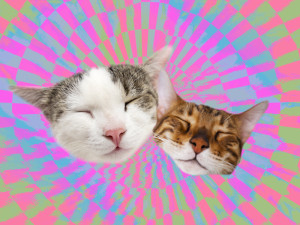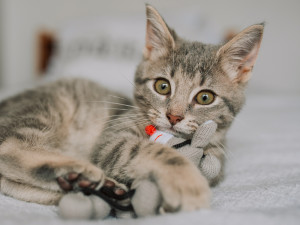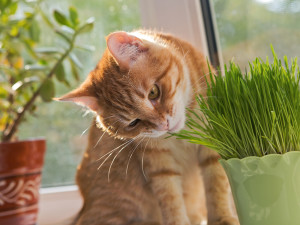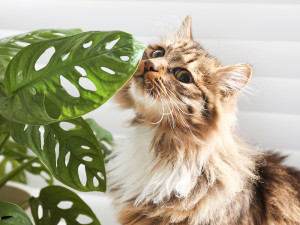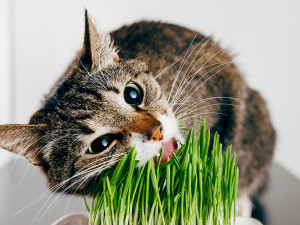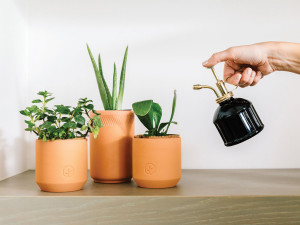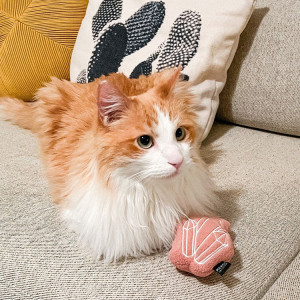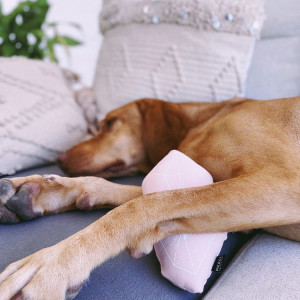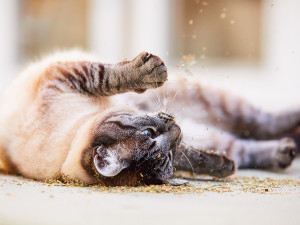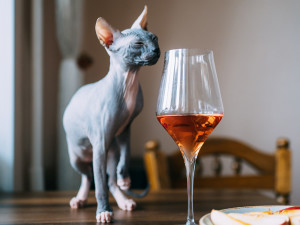Can Cats Eat Catnip?
They’re definitely pulling for the answer to be an emphatic “yes,” but...not so fast.
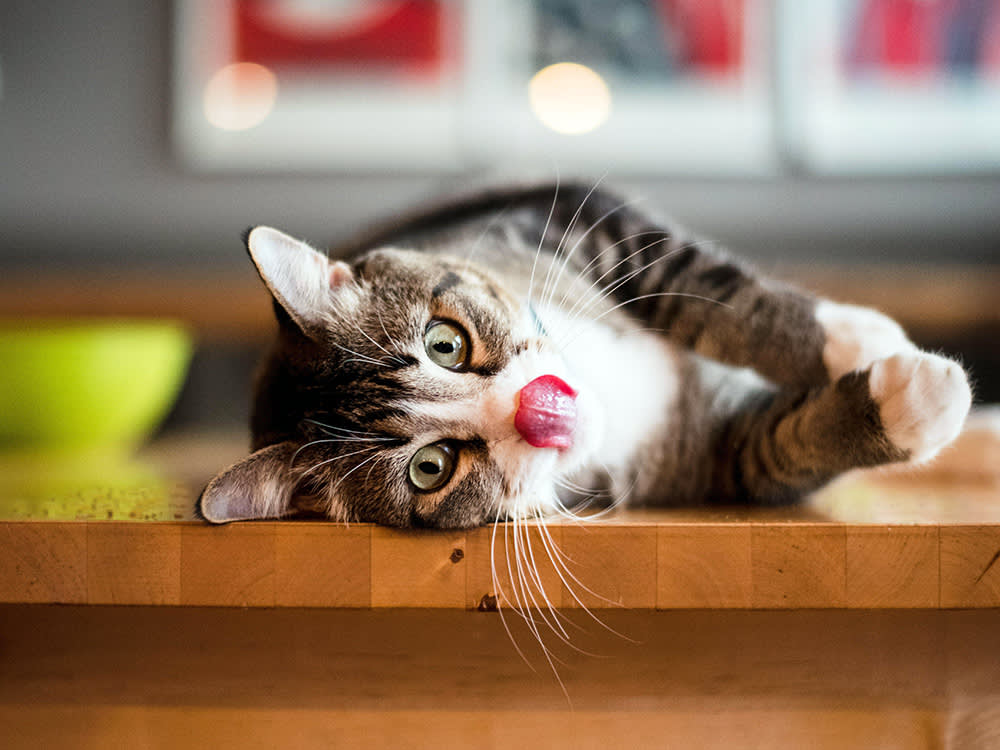
share article

Your pet wants you to read our newsletter. (Then give them a treat.)
If you have a catnip-loving catopens in a new tab, you know that the effects of this plant can be wild. When you watch your cat roll around with their favorite catnip toy, experiencing bursts of silliness, zoomies, and intense cuddle sessions, you may wish catnip had the same effects on you, too.
In fact, catnip has been used by humans for a number of ailments over time, though its effects are often unpredictable and inconsistent. Catnip has also been known for a long time to induce a kitty highopens in a new tab when they smell it, lick it, or even eat it. And while most cats will be content just to smell it and get their buzz on, of course there are always some kitties who need to push the boundaries and eat a whole bunch of it, too.
So, you may be wondering, is it safe for your cat to actually eat catnip? The answer is that it is safe in small quantities but they should not consume too much of the plant. Read on to learn more about catnip and its effects on cats.
Nutrition facts about catnip for cats
Catnip comes from the Nepeta catariaopens in a new tab plant, which is in the mint family. It is a flowering plant that is easy to grow in most home gardens and is also sometimes called Catmint or Catswort. Cats are attracted to the strong smell of the plant. It is usually marketed for cats in the form of dried leaves, but the fresh leaves and plantopens in a new tab can also be shared with cats, along with liquid extracts that are made from the plant.
Nepetalactone is the active compound within catnip that causes cats to get high. You may suspect your cat is high if they start licking the catnip, shaking their head, rubbing their face, rolling around in it, and vocalizing. It is considered to be an enjoyable experience because many cats willingly go back to the plants when they find them outdoors. There are also theories that some cats hallucinate after smelling or eating catnip and it can act as a sedative or a stimulant.
When it comes to the nutritional content of catnip, there is usually not much because cats are simply smelling it or licking it and not really eating significant amounts. Cats may be more likely to chew on the live plant if they encounter it, while there are some cats that will also eat the dried leaves. Its nutritional profile has not been thoroughly studied because it is not considered a true food item, but it is known to have some beneficial properties:
Fiber: The live plant and dried leaves both contain fiber, a form of carbohydrate that is not broken down during digestion. Fiber helps to provide nutrients to the good microbes within the gut and also helps to bulk up the stool and prevent constipation. It can help cats feel full without adding calories to their diet and helps to regulate blood sugar.
Antioxidants: Catnip contains flavonoids and phenolic acidopens in a new tab, two forms of antioxidants. These compounds help to protect cells against damage from free radicals. This can have many beneficial effects in the body, including reducing the risk of certain cancers and other diseases, anti-inflammatory effects, and anti-aging effects.
Is catnip good for cats?
Whether catnip is good for cats is a nuanced question. In general, catnip is safe for most cats and can be an enjoyable experience for them, providing mental enrichment and euphoric feelings. It is not intended to be food for them and should not be used with that intention. While eating small amounts of catnip will be fine for most cats, the more they eat, the more they will be at risk for digestive upset, including bloating, vomitingopens in a new tab, and/or diarrheaopens in a new tab.
Catnip not a substitute for other nutrient-dense treats or foods that cats need to meet their dietary needs. Cats are obligate carnivores, which means the bulk of their diet needs to come from animal-derived protein and fat. They do not have a specific need for plants or carbohydrates in their diet, and while they can safely eat some, it should be kept to a minimum. There are also some specific situations when catnip is not necessarily good for cats including:
Kittens under eight weeks old: Typically kittens under eight weeks old do not react to catnip. Once they mature, they may become responsive to its effects. It would not be harmful to offer it to them; however, it will not have the same benefits, and they would still be at risk of digestive upset if they ate a large amount of it.
Genetically immune cats: Not every cat will react to catnip. This is because the sensitivity to catnip is a dominant genetic trait, meaning that cats who are recessive for this trait are not able to experience its effects. If you have an adult cat that has no interest in catnip, they may be genetically immune to its effects. There are other herbs, such as silver vineopens in a new tab, that you can try for enrichment.
Aggressive cats: Catnip can have sedating effects on some cats, but stimulatory effects on others. This can make certain cats more volatile and aggressive. If your cat is prone to aggression, it may be best to avoid getting them high on catnip. This is especially important before trips to the vet; do your vet clinic a favor and don’t sprinkle catnip inside your cat’s carrieropens in a new tab if they tend to be difficult to handle. This can turn up the heat even more and make your cat act like the Hulk during their check up.
Cats with seizures: There have been some reports that catnip can lower the threshold for seizures, making it more likely for a cat to have a seizure after they are exposed to catnip. While this is very rare and not a concern for most healthy cats, it is important to keep in mind for cats with a history of seizures. Cats who have these conditions should avoid catnip.
Can cats eat dried catnip?
Eating small amounts of dried catnip is safe for cats. It does not have to be ingested in order for cats to experience the effects of a catnip high. They can simply smell or lick the product and that will produce the same effects. Some cats do enjoy chewing on the leaves and there are no serious health implications if they eat some of the leaves. Eating large amounts of catnip in any form is not recommended as this can cause digestive upset including bloating, vomiting, and/or diarrhea.
Is catnip completely safe for cats?
Catnip is quite safe for cats, whether they simply sniff it to experience an altered state of awareness or if they eat a small amount of it. There are some cats that should avoid catnip, including cats with a history of seizures or aggression. And of course, too much of any good thing can be detrimental, so be sure to limit how much your cat actually ingests to avoid waking up to a pile of vomit or diarrhea when you least expect it.
The bottom line: Can cats eat plants like catnip?
It is difficult to generalize whether cats can eat plants because the answer is that it depends largely on what plant, what part of the plant, and how much of the plant they consume. There are many plants, including lots of fruits and vegetables, that are safe for cats to snack onopens in a new tab. There are also many safe plants to have in your home that wouldn’t hurt your cat if they were to take a few bites.
But there plants that are highly toxicopens in a new tab and should be kept completely out of reach to avoid accidental ingestions. The bottom line is that it is very important to do your research and be sure that plants and human foods are safe for your cat before allowing them to take a bite. There are many great resourcesopens in a new tab to learn about which plants and foods are safe for your cat and which ones may be toxic. If you are unsure, always check with your vet before sharing something new with your cat.
Other plants and foods that are safe for cats
Houseplants that are safe for catsopens in a new tab include money trees, spider plants, and many others.
Fruits like blueberriesopens in a new tab, melon, and banana can be safely shared with your cat.
Cat grassopens in a new tab can be both decorative and delicious.
Other plants and foods that are dangerous to cats
Lilies are highly toxic opens in a new tabto cats, along with many other common houseplants.
Garlicopens in a new tab, onions, and other plants in the Allium family are also toxic to cats.
Many other foods opens in a new tabthat we eat routinely can be toxic to cats so be sure to do your research.
FAQs (People also ask):
Is it OK to give cats catnip?
Yes, catnip is non-toxic and can give cats a euphoric high. It should be avoided in cats with a history of seizures or aggression, however.
How much catnip can a cat eat?
A few bites of catnip are safe for a cat to eat; however, it is not intended to be consumed in large amounts.
Why do cats like catnip?
Catnip causes cats to get a euphoric buzz when they smell or lick it. Not all cats are sensitive to these effects because it is a genetic trait.
Can cats drink catnip tea?
Small amounts of catnip tea are safe for cats as long as there are no other ingredients. Large amounts could cause vomiting or diarrhea.
References

Dr. Amy Fox, DVM
Amy Fox, DVM is a small animal veterinarian in New York City. A lifelong animal lover, Dr. Fox studied biology in college and then worked as a veterinary nurse before pursuing veterinary school at Cornell University. She has worked in many different settings including shelter medicine, emergency medicine, general practice, and animal cruelty and forensics. She is especially interested in nutrition, preventative medicine and care for senior pets. Dr. Fox also enjoys writing about veterinary medicine and teaching. In her free time she loves to cook, garden, and go for long runs.
Related articles
![Cat chewing on cat grass]() opens in a new tab
opens in a new tabThe 10 Best Non-Toxic House Plants for Cats
Cats love the crunch of a houseplant. These will do them no harm.
![A Terracotta kit with planters.]() opens in a new tab
opens in a new tabThis Catnip Grow Kit Provides Your Cat With a Houseplant They Can Actually Eat
If your loved ones with cats can’t keep a plant alive, this is the gift for them.
![cat with the crystal toy in pink]() opens in a new tab
opens in a new tabYou Can Transfer Your Woo-Woo Crystal Habit to Your Stressed-Out Cat
Merci Collective founder Chani Ronez on her new collection of crystal and catnip-infused toys for cats.
![a brown dog sleeps on a gray couch, surrounded by white pillows]() opens in a new tab
opens in a new tabYour Dog Can Absolutely Have Catnip
In fact, it chills them out.
![A cat rolling around in catnip on the floor.]() opens in a new tab
opens in a new tabGet This: While Your Cat Is High on Catnip, They’re Also Repelling Pests
Duuuude...where are the mosquitos?
![Grey Sphynx cat with glass of wine]() opens in a new tab
opens in a new tabHow is Cat Wine Still a Thing?
It’s five o’clock somewhere, but read this before you share a glass with your pet.

